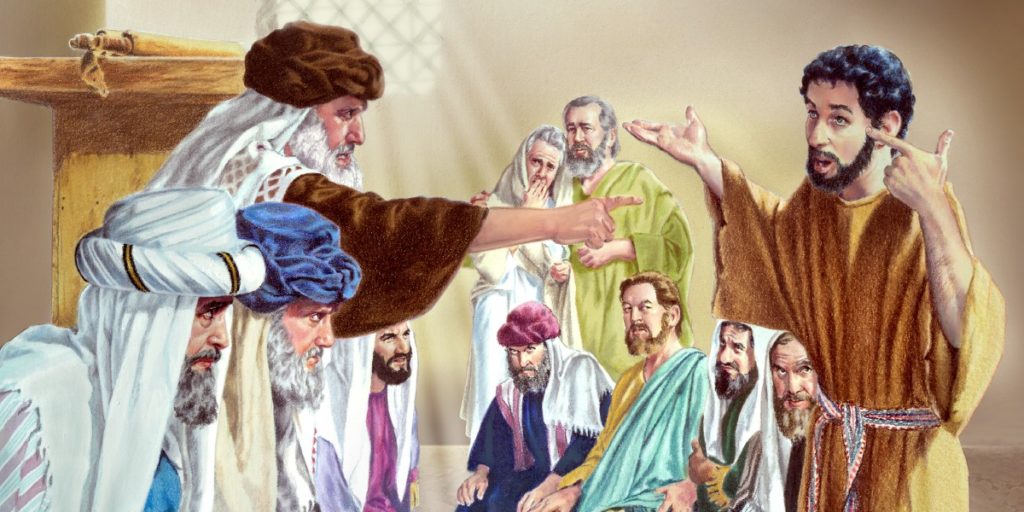Do you know who the Pharisees were according to the Bible? Learn all about them, here
The Bible mentions different historical figures and religious currents that are equally important today. Learn in the following post who the Pharisees were according to the Bible, what was their attitude towards Jesus and what characterized them.
Who were the Pharisees according to the Bible?
The Pharisees, or Pharisaism, was considered a political and social development, as well as a school of Jewish idea in the Land of Israel during the Second Temple time frame. This was just after the attack on Jerusalem and the demolition of the Second Temple in AD 70, the development of Phariseeism advanced to become the ceremonial and personalized premise of Rabbinic Judaism.
The Pharisees are particularly known for their association with the causes of Christianity, for their contention with John the Baptist and with Jesus of Nazareth. The New Testament makes reference to Paul of Tarsus being a Pharisee before he changed to Christianity and as well as these many stories.
The Pharisees accepted that its development was conceived during the time of Babylonian slavery. Some discover their beginning during Persian control or think of them as successors to the Hasidim or those who were known as amateurs and forerunners of Hasidic Judaism.
History
The starting point of the word ‘Pharisees’ is in the Hebrew term periusim and in the Greek pharisao, from which our current Spanish word is inferred. That in its grammatical structure the importance is: isolated, discreet or non-conformist.
They were characterized as a meeting during the Maccabean revolt against the Seleucid intruders. In addition, they are fortified during the government of Juan Hircano. For the most part, the expression Pharisee is used in the plural rather than alone. As indicated by the Great Josephus, at his most prominent minute there were over 6,000 Pharisees.
In contrast to the Sadducees, the Pharisees recognized his insights by the Jews in general. Thus, after the fall of the Temple, the Pharisees took over the responsibility of official Judaism and changed the clique. The most notable agent of Judaism was the High Priest, an office that, due to the destruction of the sanctuary, ended up being superfluous; So the clique went to the synagogue.
From the old-fashioned Pharisees sprang the conventional rabbinic line of law specialists who composed the distinctive Talmud. Its principle can be condensed as follows:
They had confidence in human opportunity: Absolutely fate affected men, however, these were not toys within their reach. Truth be told, they could choose what they needed to do with their life.
They had confidence in the endlessness of the spirit: Not all things end with death, but spirits lived all the time.
They relied on unceasing discipline and reward: The spirits of the malicious were limited in hell to obtain their discipline, while those of the great were rewarded.
They trusted in revival: The spirits of the great ones would get another body. It was anything but a progression of mortal human bodies, as in the different resurrection dreams, but one body forever.
They had faith in the commitment to comply with their custom: which was interpretive, which alludes to religious commitments, for example, petitions, veneration ceremonies, etc. (See Article: Prayer to the Holy Spirit for love )
They were happy to increase the political impact in the life of Israel: Perhaps previously they had a specific burden before Herod, however, after that rule they lost impact.
The Pharisees restricted the strategy of the High Priest John Hyrcanus, who acted supported by the Sadducees. John Hyrcanus, the son of Simon Maccabee, lived more as a so-called agnostic ruler than as a proper Jewish minister, and conventionalist segments examined the recognizable test between eminence and ministry, calling for a partition of the two capacities.
The pioneer of the Pharisee Eleazar requested that the character Juan Hircano deny the high organization. The confrontation of the Pharisees against the Sadducees ended intensely during the rule of his sons, Aristóbulo I and Alexander Janeo. The last put down a general uprising and executed three thousand Pharisees, is what is known to this day.
Alexander’s widow, the well-known Lady Alejandra Salomé, also ruled in later years. She is she, she restored the Pharisaic ministers and made them part of the Sanhedrin, expanding their political and religious impact. The ruler appointed his second son Hyrcan as High Priest at that time, with the support of the Pharisee.
The younger brother named Aristobulus II, was announced lord at Alexandra’s demise and dismissed Hyrcanus II, who sought asylum among the Nabataeans, with whose ruler Aretas III and with Pharisaic assistance they attacked Jerusalem in later years. However, he was crushed by the fact that the Romans reinforced Aristobulus II.
Because of the efforts of his chancellor, the Idumean Antipater, this young man gained the aid of the Roman general Pompey, who then took Jerusalem and restored him as High Priest, bringing Aristobulus to Rome, while Antipater actually practiced as leader of Judea.
The political and religious intensity of the Pharisees remained that way. After Pompey died, Julius Caesar appointed Herchan, the son of Ethiopia, as the top military leader. (See Article: The power of early morning prayer )
Much later the Antigonus Mattathias, who was the son of Aristobulus II, with the help of the Parthian Empire and the Sadducees, took control, stopped and destroyed Hyrcanus II in the clashes. Herod, who had fled and the Roman general partner, continued in Jerusalem afterward.
In intrigue with the Roman Empire, Herod was ruler. Also, he married Mariana, the daughter of Hyrcanus II, who at that time he executed, causing the rupture between the Pharisees and the Herodian administration.
On the 4th, the Pharisee Saddoq and Judas the Galilean stood up calling for Rome not to comply with the statutory expenses. Herod’s son Archelaus and the Roman military pioneer Varus suppressed the uprising: two thousand renegades were killed.
This revolt is considered to be the birthplace of the Zealots, who thought that the best way to throw off the Roman charge was by taking up arms, as they tried with a harrowing and deadly result. The challenge ended with the added suicide of Masada blocked.
tear the garments
There is a part of the Bible where it is stated that the Pharisees “ripped their clothes” before the expressions of Jesus or ancient custom in mourning or open commotion, has made the expression “rending the clothes” well known in certain Christian nations, to express anger. He pretended to be someone on a specific occasion, opposing it.
In numerous entries in the New Testament, the Pharisees are shown as sectarians, protectors of the oral law that annulled the Mosaic law.
Characteristic
The Pharisees were characterized by being:
Murmurers: “… The Pharisees murmured against the pupils …” reflects it in Luke 5:30. The Pharisees… murmured, saying:
This catches the heathens, and eats with them.
Luke 15:2
Hypocrites: in Matthew 23, in the 7 years to which Jesus refers, they blame him for the word service.
“…within you is full of lip service and wickedness.”
Matthew 23:28
“They were appeased with the “equity” of appearances”
Luke 11:42,43
The word that gives the outline of what self-righteousness is in itself is the dishonest word and Jesus is the person who expresses it in the book of Luke 12. Obedience was fragmented, they ignored the most significant things, as the word
“…also, these are the things I should have done, not ruling those out”
Matthew 23:23.
The Pharisees obeyed certain directions, but discarded different rules. Your duty is not over. In addition to this they were loaded with deceit according to Matthew 23:29.
his influence
It was the dominant and most powerful order that Jewish individuals managed to have, as we can examine in the New Testament and it regularly appears among Jesus’ adversaries in light of their narrow-mindedness toward others and their penchant for accentuating external problems in order to ignore them. the most significant things.
Your Instruction
– Men like Gamaliel, who were also Pharisees, learned from men and knew the law and the prophets.
“At that moment, a Pharisee named Gamaliel, a specialist in the law, adored by the considerable number of individuals, ascended the meeting and asked the witnesses to take them away for a minute, and then said: “Men of Israel, look for yourselves. “. What will you do with these men.
Since before today, Theudas got up saying that he was someone. For this he included a number of about four hundred men; however, he was killed, and all who obeyed him were dissipated and reduced to nothing.
Judas the Galilean arose in the times of enumeration and led many individuals after him. Furthermore, he died, and all who obeyed him were scattered.
At that moment, the scripture expresses them “leave from these men and avenge them; and this exhortation or this work that has a place with men, will disappear; however, in the event that it is from God, it cannot be devastated; might not be discovered fighting against God.”
– Paul himself was a man instructed by the law, who stated:
“Circumcised the eighth day, of the line of Israel, of the clan of Benjamin, a Hebrew of Hebrews; with respect to the law, Pharisee”
Philippians 3:5.
Educated at the feet of Gamaliel.
Acts 22:3.
He says: “I am indeed a Jew, conceived in Tarsus of Cilicia, but brought up in this city, educated at the feet of Gamaliel, carefully according to the law of our Daddies, desirous of God, as all of you are today.”
– Later on, we see Jesus training his students to observe the lessons of the Pharisees, “…In this way, whatever they lead you to keep, you must do…” Matthew 23:1-3.
His Doctrine
His idea of the Scriptures adapted his lessons and practices, for example, the “convention of the elderly” formed along with the books of the Old Testament is his regularizing and moral premise.
Furthermore, he addressed them:
“Why, furthermore, do you transgress the precept of God in view of your custom?”
Mark 7:3
For the Pharisees and each one of the Jews, who maintained the custom of the ancients, if they do not commonly wash their hands, they do not eat.
– The connection of the Pharisees with Jesus regarding the law, the prophets and the works, was perceived as Scripture, but also the prophets, the hymns and the works are also taken into account; since in his debates with Jesus he alludes to each of these pieces of the Old Testament.
“Or have you not observed the law, how on the Sabbath the ministers in the sanctuary profane the Sabbath and have no faults?”; Directed by God, saying: Honor your father and your mother; and: He who condemns father or mother will desperately seek death.
Matthew 12:5
Then he, answering, said to them:
Have you not considered that he who made them in the first place, male and female, made them, and said: Therefore shall man leave father and mother, and shall divide for their significant other, and both shall be one body? “
Matthew 19:45
Prophets: The scripture shines when it says: Go, at that point, and understand what it means to need benevolence, and not give it up. “For as Jonah was three days and three nights in the stomach of the incredible fish, so will the Son of Man be three days and three nights in the center of the earth.”
He largely made Isaiah’s prediction of you when he gave: This individual respects me with his lips; But his heart is far from me. As useless as they respect me, Teaching as regulations, the decrees of men.
“The Lord said to my Lord: Sit at my right hand, until I make your adversaries your socks.”
Mt 22:44
So that all the righteous blood that has been shed on earth may pass over you, from the blood of Abel the noble to the blood of Zechariah son of Berechiah, whom you executed in the sanctuary. and the special staggered area you must sanctify yourself in word and heart. (See Article: Night Prayer Psalm 4 )
Through the New Testament
Despite the fact that there are several sources of narrated data about their identity, what they thought and what the so-called Pharisees spoke in the Judaism of the time of Jesus and later; It is energizing to take a journey through the New Testament to learn about their identity, what they made of Jesus, and what Jesus’ disposition was toward them.
Fortunately, there are numerous references in the Gospels and in the Acts of the Apostles, which allow us to know much about the fundamental attributes of the Pharisees. We will try to know something about their beliefs, criticisms, doctrines and practices towards Jesus, among other things.
At last, we will try to look at the remote possibility that we take the Pharisees to some extent and what we should do to keep from falling into their own confusions.
The beliefs of the Pharisees
It should be noted that they maintained a strict guide to the rules of the law. It was extremely annoying even in the smallest subtleties since they had very different norms than other religious currents. In addition, numerous things have been taken to save, for example, the washing of drinking containers, containers and metal utensils. , and the beds.
They kept a close watch on Jesus about what might or might not be possible on the Sabbath. It follows from this that there was a guideline about that:
“And they were watching to verify if they worked on the day of rest or would recover, in order to be able to report it”; they thought so.
Jesus from that time went to his property, and his supporters followed him, and when the Sabbath came, he began to instruct in the synagogue, and many, hearing him, were astonished and said: “Where is this man? What things is this knowledge that he imparts? What is more, what is this knowledge that is given to him, and these supernatural happenings that are made with his hands? “
They themselves violated God’s law which they tried to satisfy in detail, “By leaving God’s edict, you adhere to the convention of men: the washing of vessels and drinking vessels, and you do many other similar things. Things like these were what God saw with displeasure.
The bases
They relied on writing, only that at convenience they taught their studies, despite being teachers of the law, they did not have the wisdom to correct but to point out.
- They accepted that God controlled all things, but then the choices made by people added to the course of an individual’s life.
- They had faith in the revival of the dead (Acts 23:6). “At that moment, Paul, noticing that one section was Sadducees and another Pharisees, raised his voice in the committee: Men and brothers, I am a Pharisee, son of a Pharisee; about the expectation and the resurgence of the dead. I am judged.”
- They had faith in a real existence after life, with the prize and the discipline of comparison in an individual premise.
- They had faith in the presence of holy messengers and evil spirits (Acts 23:8). “Since the Sadducees claim there is no restoration, no holy messenger, no soul; yet the Pharisees insist on these things.”
- They had confidence in the restoration and in the profound world. In this they agreed with Jesus and could not avoid contradicting the precept of the Sadducees. (Mt 22:34 “Then the Pharisees, hearing that he had silenced the Sadducees, gathered together.
“That day the Sadducees came to him, saying that there is no restoration, and they asked him”
Mt 22:23
“Then Paul, noting that one section was from the Sadducees and one more from the Pharisees, put his voice on the board: Men and brethren, I am a Pharisee, the son of a Pharisee; Expectation and restoration of the dead are judged.
Hch. 23:6-8
When he said this, there was a dispute between the Pharisees and the Sadducees, and the meeting broke up. Since the Sadducees claim there is no restoration, no blessed messenger, no soul. Yet the Pharisees affirm these things.”
Your practices
The Pharisees practiced many things that today the religious follow, for example according to the Bible they also prayed and fasted:
The Pharisees were religious, continually and cautiously maintaining words of religious devotion, eg, fasting and petition. He says:
“At that time they said to him: Why do the followers of John hasten and implore, and the Pharisees, yet yours eat and drink?”
“When you make offerings in this way, do not blow the trumpet before you, as the charlatans do in the synagogues and on the boulevards, so that men praise you; I swear they just got their reward.”
Luc. 5:33
They rejoiced to have a place in the Jewish race, to be descendants of Abraham. In the bible it expresses: “Deliver in this way the natural products that deserve to repent, and think that you should not say within yourselves: we have Abraham as our father; since I reveal to you that God can educate the young men of Abraham even from these stones”
This mentality weakened them to be reached in the sanctification of John:
“However, the Pharisees and the mediators of the law discarded the plans of God concerning themselves, not being sanctified by the water by John.”
Lc. 7:30
They avoided not being “contaminated”, they thought of corrupting and deeply degrading the association with people who did not carefully keep the statutes of the Law; particularly with those whom the evangelists call tax collectors and heathens, the book of scriptures says: “When the Pharisees saw this, they said to the partisans: ‘For what reason does your Master eat with tax collectors and criminals?’
We can discover certain expressions, accuse the authorities, individuals of various “shameful” exchanges, and, moreover, everyday citizens, not very cautious about severe consistency with the Law. This last class of individuals was considered “vilified”.
They were nonetheless able to Recognize a Separation, although they potentially maintained some sort of disparities in their standards with different Rabbinical meetings and schools of other Jewish segments.
So the Pharisees approached him, tempted him and said, “Is it legitimate for a man to separate from his partner in some way. “They said to him: Why, at that time, Moses addressed a letter of separation and revoked it?”
Matthew 19: 3 and 7
His attitude towards Jesus
Sooner or later they seem to support Jesus and Herod, who obviously didn’t make the most of their compassion. Not entirely though, they only questioned his arrival in Jerusalem. “On that equivalent day a few Pharisees came, saying to him: Go out and make footprints in the opposite direction from here, in light of the fact that Herod needs to kill you.”
Approach of the Pharisees to Jesus. Possibly this occurred towards the beginning of his service, at which time there might be an extraordinary desire among the Pharisees.
“When, in this way, the Lord understood that the Pharisees had heard: Jesus makes and immerses a greater number of devotees than John.” Particularly noteworthy is Nicodemus’s enthusiasm and his recognition of the extraordinary individuality of Jesus.
John 4:1
“There was a man of the Pharisees whose name was Nicodemus, a leader among the Jews. He came to Jesus during the night and said: Rabbi, we realize that you have originated from God as an educator; since no one can do these signs that you do, if God is not with him.
John 3:1-3
Jesus answered him and said: “Without a doubt, I declare that, unless one is conceived again, he cannot see the Kingdom of God. “This intrigue, no doubt, could have been shared by a number of different Pharisees. From time to time they perceive that Jesus appreciates reality without seeking simple recognition. Jesus accommodates his words to this effect with an accusation of false reverence.
“Then the Pharisees went away and asked that they surprise him in any capacity.” And they sent their supporters to the Herodians saying, “Ace, we realize that you are a fan of reality and that you educate honestly.” the method for God, and that you do not deal with anyone, since you do not take a look at the presence of men.
John 3:1-3
Let us know, at that time, what you think: is it legal? To pay homage to Caesar, or not? “But Jesus, knowing his harmfulness, said to them: Why do you attract me, you lazy one?” And to her he said: Your transgressions have forgiven you.
Furthermore, the individuals who were sitting together at the table began to declare among themselves: Who is this, who equally excuses sins?” (See Article: Christian prayer for travel )
The first disputes of the Pharisees regarding Jesus, was when they begin to detect impious behavior in Jesus (according to them) when he openly excuses sins, since they correctly thought that God only had the expert to forgive sins.
They condemn their kinship with individuals they consider to be heathens and publicans, since they “sat down at table” with Jesus. They believed that someone who should satisfy God would have to leave those types of individuals in the same way.
Then we see in Matthew 9:10-11
“And it came to pass, as he sat at table in the house, that he saw numerous publicans and criminals who had come, together with Jesus and his students at table. The Pharisees said to the devotees: Why does your Master eat with publicans and criminals?
His first accusation against Jesus is practically progressive curiosity: “He gets criminals and eats with them.” In Luke: “All the harvesters and the criminals came to Jesus to listen to him, and the Pharisees and the recorders murmured.
He condemns Jesus’ mentality about the Sabbath. Based on his uncompromising nature and his diligence to satisfy every subtlety he had been addressed by others in his translations and commentaries. “When the Pharisees saw him, they said to him: Look, your devotees are doing what is not lawful to do on the Sabbath.”
“Once more Jesus entered the synagogue; and there was a man there that had a withered hand. Also, they sneaked in to check if the Sabbath would be repaired, to have the option of blaming it…Furthermore, the Pharisees left and consulted the Herodians so that they “would not destroy it”
“Then, a portion of the Pharisees declared: This man does not originate with God, since he does not keep the Sabbath. Others said: How can an evil man do these signs? Also, there was a dispute between them.”
John 9:16
They test Jesus with dubious doctrinal perspectives to “lure” him and “surprise him in a word.” Jesus does not dodge questions. “Then the Pharisees came to him, tempted him, and said to him, Is it lawful for a man to separate himself from his best half in any way, shape or form?
“Then the Pharisees went away and asked that, in a word, they surprise him. Furthermore, they felt their followers with the Herodians, saying: Master, we realize that you are an admirer of reality and that you educate honestly.”
22:15-17
In the method for God and that you do not deal with anyone, since you do not take a look at the presence of men. Let us know, at that time, what do you think it is to pay homage to Caesar or not? “
Then the copyists and the Pharisees presented him with the lady who received the infidelity; and when placing it in the center of it, they said: Teacher, this lady has been in the same manifestation of infidelity. The law Moses instructed us to stone. those ladies.
John 8: 3-6
You guys, what do you say? Be that as it may, however, this said that it attracted him, to have the option of accusing him, however, Jesus, bowed to the ground, made writing with his finger.
Just like these, there are many stories in the Bible where the Pharisees are shown as false accusers and rulers of the law, they were characterized as legalists. They wanted to tempt Jesus, they wanted to enter disputes with God himself, something that is impossible to execute. For this and more it is necessary that you know who the Pharisees were according to the Bible.

Hello! Let me enthusiastically introduce myself as a dedicated blogger fueled by an intense passion for meticulously crafting insightful and well-researched blogs. My mission revolves around providing you, dear readers, with a veritable treasure trove of invaluable information.







